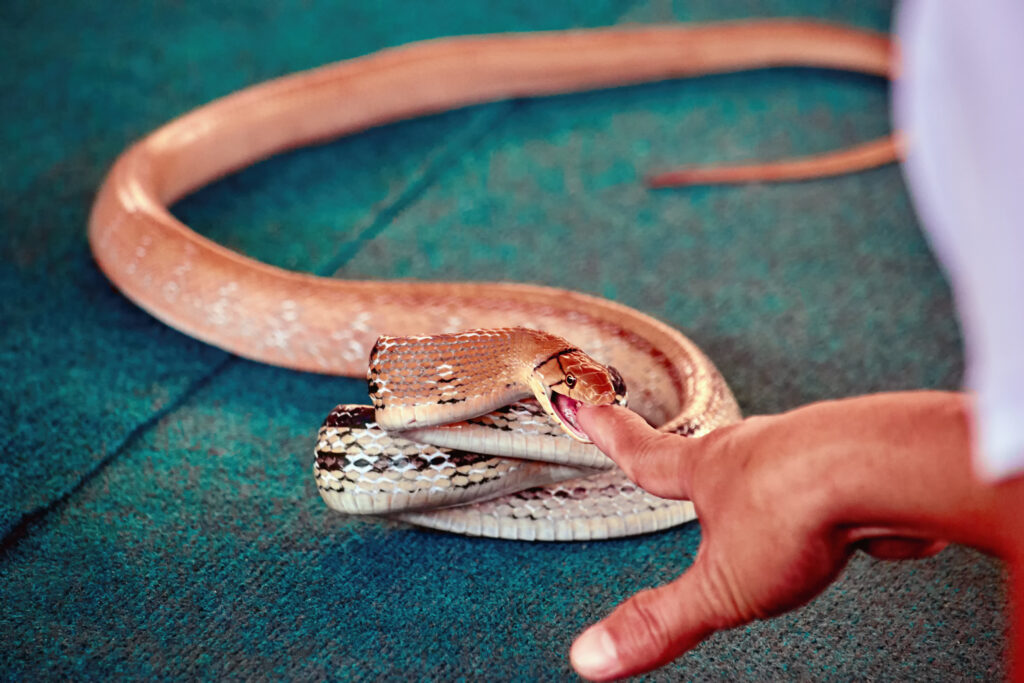Thanks to the efforts of a “hyperimmune” man who injected himself with snake venom a staggering 856 times over nearly two decades, U.S. scientists have been able to develop an “antivenom cocktail” that helps protects against 19 of the world’s deadliest snakes.
The concoction, which consists of antibodies and a small molecule inhibitor drug known as varespladib, provided full protection against 13 snakes and partial protection against six more in trials done on mice, S. researchers noted in a study published in the journal Cell.
The antibody donor—Tim Friede—chose to inject himself with venom from 16 snakes species in order to generate antibodies in his body that could neutralize various venoms.
Snakes involved included black mamba, king cobra and tiger snakes, with the study paving the way towards the development of a “universal antivenom.”
Snake envenomation, which was added to the World Health Organization’s list of neglected tropical diseases in 2017, causes over 100,000 deaths and around 300,000 permanent disabilities in humans every year.
Making an antivenom typically involves collecting antibodies produced from horses or sheep that have been immunized with venom from a single or a few related snake species.
While this method is effective, it also comes with the risk of adverse reactions to treatments derived from non-human antibodies. The efficacy of the antivenom can also vary widely even within a species due to localized genetic variations.
On their quest to improve this method of making antivenom, the researchers came across “a hyperimmune human adult male donor” who was “identified with a documented 18-year history of 856 self-immunizations to venoms” from 2001 to 2018, the study noted.
“The donor, for a period of nearly 18 years, had undertaken hundreds of bites and self-immunizations with escalating doses from 16 species of very lethal snakes that would normally a kill a horse,” said lead author computational immune engineer Jacob Glanville of biotechnology firm Centivax in a statement.
“What was exciting about the donor was his once-in-a-lifetime unique immune history,” Glanville said. “Not only did he potentially create these broadly neutralizing antibodies, in this case, it could give rise to a broad-spectrum or universal antivenom.”
The scientists said the global impact of having “a single, universal, human-derived antivenom would be substantial,” noting that such “would avoid the need for species identification as a pre-requisite for administering antivenom treatment.”
They added: “It would provide coverage for many of the 650 species of venomous snakes and diverse geographies for which there is no current adequate antivenom.”
The researchers are now looking to test the antivenom on dogs brought into veterinary clinics for snake bites in Australia, with a view to develop an antivenom for the other major snake family—the vipers.
“We’re turning the crank now, setting up reagents to go through this iterative process of saying what’s the minimum sufficient cocktail to provide broad protection against venom from the viperids [vipers],” said paper co-author and biochemist Peter Kwong of Columbia University in a statement.
“The final contemplated product would be a single, pan-antivenom cocktail or we potentially would make two: one that is for the elapids and another that is for the viperids because some areas of the world only have one or the other,” Kwong noted.
Do you have a tip on a science story that Newsweek should be covering? Do you have a question about snakes? Let us know via [email protected].
Reference
Glanville, J., Bellin, M., Pletnev, S., Zhang, B., Andrade, J. C., Kim, S., Tsao, D., Verardi, R., Bedi, R., Liao, S., Newland, R., Bayless, N. L., Youssef, S., Tully, E., Bylund, T., Kim, S., Hirou, H., Liu, T., & Kwong, P. D. (2025). Snake venom protection by a cocktail of varespladib and broadly neutralizing human antibodies. Cell, 188(1), 1–18. https://doi.org/10.1016/j.cell.2025.03.050
Read the full article here
